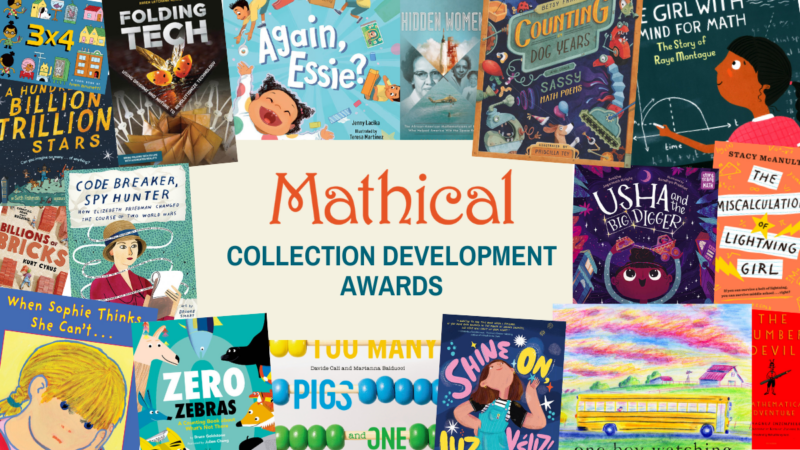School Library Journal (SLJ) and the Simons Laufer Mathematical Sciences Institute (SLMath) have announced a sixth cycle of a funding program aimed at getting literary fiction and nonfiction inspiring a love of math into the hands of K–12 students in Title I schools. The Mathical Collection Development Awards are available to school libraries in qualifying schools in the U.S.
Presented by SLMath in partnership with SLJ, the collection development awards will enable up to 36 libraries in K–12 schools with high numbers or percentages of low-income students to receive grants of $850 to purchase titles from the Mathical Prize list.
Applications open September 26, 2024 and close November 7, 2024.
The Mathical Book Prize recognizes outstanding youth trade fiction and nonfiction selected to inspire a love of math in the world around us. Prize-winning books span grades PreK through 12 and feature novels, biographies, chapter books and picture books and are selected every year by a committee of math teachers, reading teachers, mathematicians, librarians, early childhood experts, and others.
The Mathical Book Prize is awarded by SLMath in partnership with the National Council of Teachers of English (NCTE) and the National Council of Teachers of Mathematics (NCTM), and in coordination with the Children’s Book Council (CBC). The prize is made possible with support from the Firedoll Foundation, the Guru Krupa Foundation, and the Luce-Fahey Family Foundation.
The 2024-25 Mathical Collection Development Awards are generously supported by the Guru Krupa Foundation (GKF). The Guru Krupa Foundation follows a holistic approach to charitable giving, addressing a range of issues from education to basic sustenance, arts & culture, and the environment. In particular, organizations that focus on delivering complementary or supplemental programs for younger children, designed to enhance the learning experience and outcomes, form a core component of many of the Foundation’s initiatives.
2024-25 Mathical Collection Development Awards Sponsor
Eligibility:
Schools applying for the grants will need to document their Title I status. To be eligible for the collection development awards, schools must employ a full- or part-time librarian who meets state requirements for school library media certification and is currently employed as a media specialist, teacher librarian, or equivalent position.
Application requirements:
- Description of school library (mission, collection scope, staff, budget, physical plant)
- School/student demographics
- Description of community served
- Proof of Title I funding
- Plan for using books from the Mathical Prize list, including list of titles; estimated cost; explanation of how prize would benefit library/school goals, serve students and the community
- A letter of recommendation from a principal, math coordinator, superintendent, or teaching peer
- Detailed verified information regarding grant payment logistics pertaining to the individual school
- A statement about fostering a sense of joy around math
Reporting requirements for collection development award recipients:
- A list of Mathical titles purchased for the library
- Three (3) photographs of students enjoying the books (shared with permission to publish, including appropriate photo releases for minor subjects)
- Completion of a short online form in a timely manner. In the form, award recipients must provide: a story about student interaction with the Mathical titles; one programming idea you are considering for the Mathical titles; if the recipient has gifted any Mathical titles to other school libraries, information about the recipient (name of school, school librarian, titles and quantity of books shared with that school); any suggestions the recipient may have about future grant programs like this one
Judging process:
Winners will be determined by SLJ staff. Priority will be given to schools whose library staff demonstrate the greatest promise in using funds to advance the goals of their school library, and who are enthusiastic about encouraging students to explore a love of mathematics in their everyday lives. Diversity of geographic location and grade level of students served will be considered in the determination of a final set of winners.

